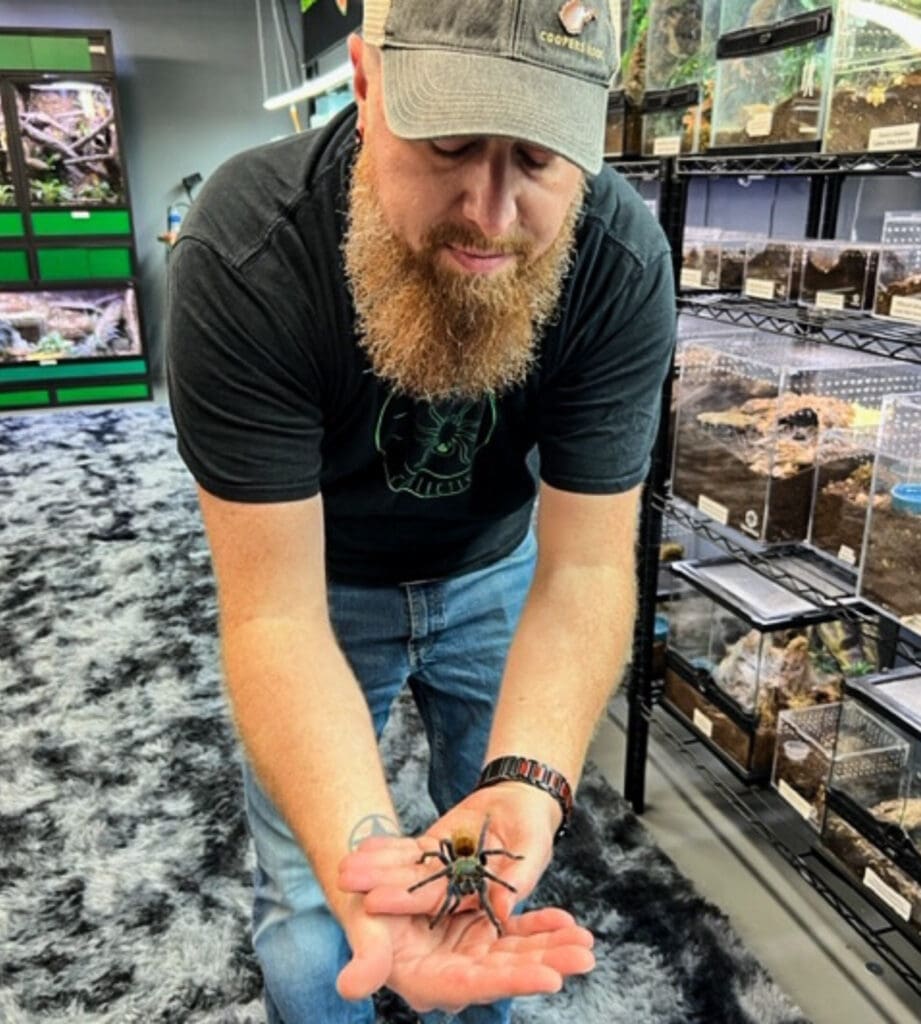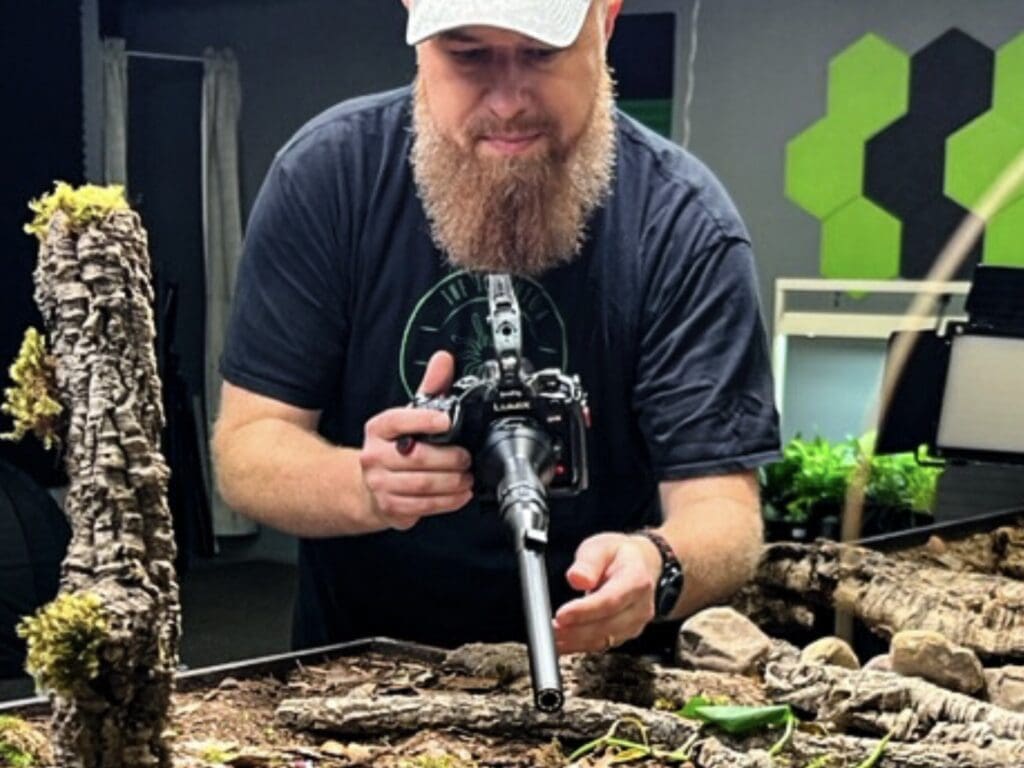Richard Stewart had spiders in his basement. Tarantulas. About 200. Very hairy. Very scary. Quiet, secretive, and fast. Each with eight eyes and eight legs. Webs. Fangs. Venom. And reputations.
One of the misunderstood misfits of the insect world – a large dark hairy tarantula – had a cameo as a villain in “Dr. No.” It crawled into bed with James Bond and then meandered up his naked torso while avoiding the 007 flop sweat.
SPOILER ALERT! Bond, stirred and shaken by his brazen bedmate, quickly grabbed a shoe and with one … two … three … four … five whacks, terminated it with extreme prejudice.
“It is comical,” Stewart said. “Learning just the basic information about tarantulas makes scenes like this and movies like “Arachnophobia” and “Kingdom of the Spiders” look just ridiculous. You realize these people are really overacting when you know these tarantulas are actually harmless and not aggressive at all.”
Peter Parker is “The Amazing Spider-Man.” Stewart? More like “The Affable Tarantula Guy.”

Stewart had to face his fears about creepy crawlies before he saw the beauty in tarantulas. “I love this thing, even though it is incapable of loving me back,” he said. He also saw the potential in tarantulas.
During the COVID saga, Stewart, 41, made his avocation his vocation. He relocated his family of spiders to a Wheeling-area shopping plaza and made his Tarantula Collective a web-based business.
In fewer than three years, Stewart attracted tens of thousands of followers on Instagram and Facebook and 153,000 subscribers on YouTube. His 12-minute, cinematic-like tarantula videos have generated more than 15 million views, and several YouTube awards recognizing his accomplishments.
“We love the unloved. We care for the feared,” is Stewart’s near-sacred mantra. However, he couldn’t have made that blanket statement during the first half of his life. Stag Beetles have really big pinchers.
A big black one crawled into his blanket when Stewart was a toddler. Then, it started mangling his host. Dad rushed in and brushed off the intruder from his screaming and shaken son. The trauma lasted for years.
Augustana College (now University) in South Dakota, was light years from home. Stewart, a poor Baptist boy from West Virginia who dressed goth, and wore jeans and punk rock T-shirts, did not fit in. But his ability to play the French Horn and other brass instruments earned him a scholarship, and the school noted that a kid from Appalachia could add diversity to the homogeneous student body in Sioux Falls.

During his freshman year, a professor remarked that Stewart did not have a fear of spiders (after all, with a shoe, he could flatten one); the issue was his fear of the unknown.
So, Stewart bought one of the few types of pets allowed in the dorms; a tarantula. “Rosie” was a Rose Hair. It was not exactly a rosy picture at first. For the first month, no touching, just observing and a bit of feeding, he said. It took a while for the hairy misfit to fit into Stewart’s world.
“Soon after that, I got a little more brave and started to open the enclosure to show her to my friends,” he said. Stewart and his roommate were polar opposites, well, more like South and West. Most of the students at that exclusive Lutheran school looked as if they’d just stepped out of an Abercrombie & Fitch catalog.
When Stewart was studying and allowed Rosie to meander along his body, in her docile and clumsy way, he noticed that his stylish roommate became very skittish and now the roomy was the outcast.
“So, I got the dorm room to myself, a lot,” Stewart said.
After moving to Wheeling a few years ago, he collected more tarantulas. “They are beautiful to look at,” Stewart said. “They’re fascinating to watch. They’re unlike pretty much any other animal out there. And I get to watch them live and move around and spin webs and eat and breath. And there’s also a very calming effect.
“Some people got into tarantulas because, I think, they themselves felt unloved by their parents or by society,” Stewart said. “Maybe the music they listen to or the way they were dressed, they kind of felt like an outcast or marginalized. And they identify those feelings with the tarantulas, especially when they get to learn about the spiders. Well, these things are misunderstood, and they’re marginalized, and then they are hated, just because of the way they look.”
But tarantulas also can be, well, kind of therapeutic.
People suffering with Post Traumatic Stress Disorder or those who are developmentally challenged can benefit from interacting with tarantulas, Stewart said. “There is something very calming about the animal’s energy.”
Creating the enclosures for them, setting them up, taking care of them; it’s almost like working in a Zen garden, he said. “You’re being of service to an animal because you really appreciate it and love that animal, not because you’re getting anything in return.”

However, some of Stewart’s fans and followers get quite a bit in return.
A few years back my Dad passed away. It wrecked me, man. A few months after he had passed I randomly came across one of your videos. I almost instantly went to a pet store and bought a T. Almost 4 years later we have a collection of Almost 70 species. Your videos taught me how to keep. You helped me cope with my dad’s passing big time man! I found this thing that my life was missing long before my pops passed. I feel closer to my pops around my Spiders. – D.J.
A few years ago, I was diagnosed with Ehlers-Danlos Syndrome and PoTs. This has massively impacted my life, going from fit and active to being in a wheelchair. My mental health deteriorated, and at times I felt suicidal because of the way my disabilities have changed my life. My partner is now the full time carer for my very active dog. I watched a lot of videos and researched tarantulas to the point I realised I needed one in my life. I picked up a Mexican Red Knee juvenile, which popped up in my local invertebrate store, and named her Tilly. After a couple of weeks, I found myself picking up and moving the most venomous spider in my country the UK (the false widow). I wasn’t afraid of the giant house spiders running around my house anymore. I found myself very quickly attached to Tilly and found her very soothing to watch and she lifted my mood. Tarantulas are something I am easily able to look after, even with my disabilities. – Rhiannon
When I first started keeping tarantulas 4 years ago I was not in a good place mentally. Throughout my life I have never felt like I fit in anywhere.
I was dealing with depression and some very rough moments of high anxiety as well and things just weren’t really looking all that great for me. My first ever T was an avicularia avicularia (Guyana pink toe) that I bought as a bigger juvenile and raised till it matured out as a male and died.
That tarantula changed everything for me.
I feel like people don’t really understand just how misunderstood these creatures are and I could relate to how I saw them because I feel like I, myself, was also very misunderstood. In a weird way, I saw myself in these creatures. From building my collection to checking on them every day and just being indulged in the tarantula-keeping hobby has really changed my mental health for the better. 8 legged hairy creatures did what medicine, therapy, and psychiatrist appointments couldn’t do. – Tom

Stewart also was able to help one of the first Fab Five, to overcome his fear of the hairy crawlies.
An appreciative Jai Rodriguez, part of the original cast of “Queer Eye For The Straight Guy,” was on a Stewart YouTube podcast. This is the link:
Link: https://youtu.be/L2HwlDDP_Qg?si=SKz-2iwa4wIQZlWh
Stewart has been invited to speak at insect-themed conventions in the US and in the UK. Near-constant requests for autographs and selfies are part of his life, these days. Stewart calls it “fangirling.” Peter Parker, eat your Spidey heart out.
After all of this success, does he still feel like an outsider, an outcast?
“Yeah, in some ways,” Stewart said. “Because you can really be loved within your own little niche, but then, outside of it, the general public still can be like ‘you keep spiders as a pet? You’re a freak. Why would you do that?’”


